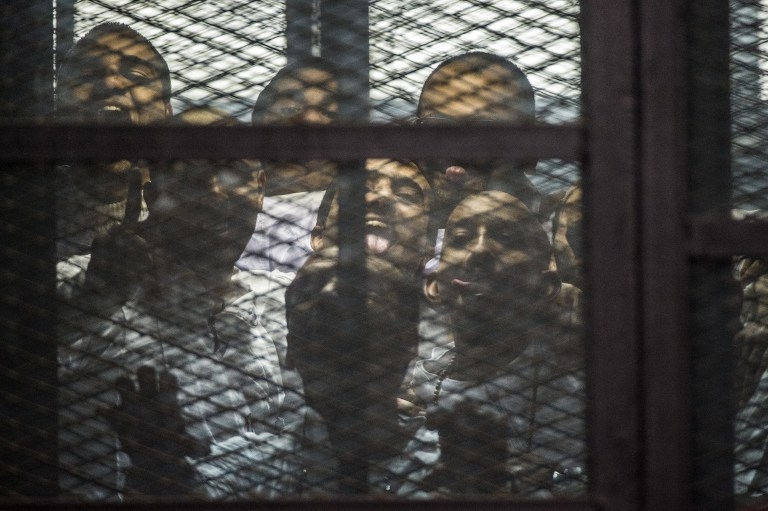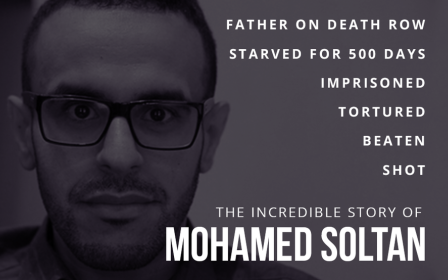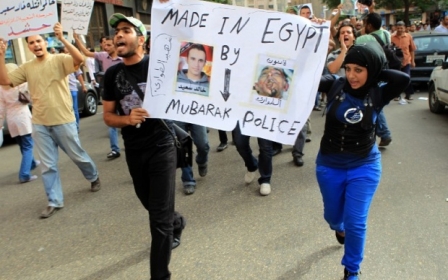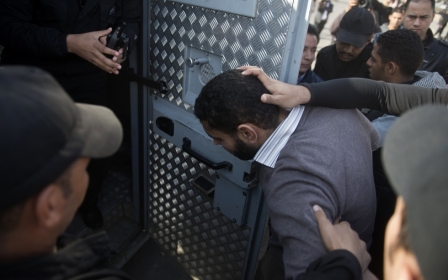Deaths in Egyptian prisons trebled since Sisi-led coup: Report

A human rights organisation has documented hundreds of cases of death as a result of torture and medical negligence in Egyptian detention facilities over the past two years, claiming that newly adopted laws have been a principle reason behind the phenomenon.
In a report titled: “Death behind bars: Torture and denial of medical care in detention in Egypt," the Swiss human rights organisation Alkarama shows evidence that the number of deaths in detention has trebled in Egypt since General Abdel Fattah al-Sisi led a military coup on 3 July 2013.
The report documents 323 cases of death in Egyptian prisons between August 2013 and September 2015, which the organisation alleges were “direct consequences of torture, ill-treatment or denial of medical care”.
According to the report, 52 deaths were documented during the rule of the Supreme Council of the Armed Forces between February 2011 and June 2012, while another 56 deaths were documented during the presidency of Mohamed Morsi - between June 2012 and July 2013.
On the other hand a total of 132 deaths were documented during the interim government following the military coup and up until June 2014, while another 191 deaths have been documented since Sisi was elected president in June 2014.
The report reveals in-depth information and accounts from prisoners, families and human rights organisation regarding the conditions in Egyptian prison facilities, bringing to life an assortment of inhumane circumstances and ill-treatment which contradict international laws and regulations.
“What the report reveals is that deaths in detention in Egypt are not an isolated phenomenon that would occur as the result of a natural process.,” wrote Thomas-John Guinard, legal officer for the Nile region at Alkarama.
“It (the report) shows that these hundreds of deaths have been caused by the Egyptian authorities’ behaviour and legislation in force. These individuals died because detainees lack sufficient protection of their right to life and to be free from torture in detention,” he added.
According to the report, newly adopted laws give prison personnel the right to use measures of torture and negligence which has allegedly been a principle reason behind the rise in the number of deaths within detention facilities.
“The report’s findings are unequivocal in the sense that if Egypt keeps this legal framework and does not adopt new procedures regarding conditions of detention, the situation can and will only deteriorate,” Racid Mesli, legal director at Alkarama wrote.
According to the report, only 42 public prisons out of hundreds of undocumented detention centres and police stations in Egypt are regulated by laws on the regulation of prisons.
In the other detention centres and police stations across the country, “conditions of detention are worse than in regular prisons and reports of abuses are more frequent, in particular of torture and ill-treatment,” documented the report.
Alkarama documented severe cases of poor ventilation and overcrowding within cells, severe torture, medical negligence of detainees suffering chronic diseases and a lack of sanitary conditions that fall short of minimum legal standards and regulations.
American-Egyptian Mohamed Soltan, who was on 490-day hunger strike in an Egyptian prison before being released, recently revealed the conditions of his incarceration during a video interview with MEE.
He recounts “being beaten by batons and whips and the back of belts,” and of enduring endless torture while also witnessing prison personnel throwing a dying man into his room to die.
Prison graveyards
While Alkarama’s report is the most up-to-date and in-depth report on deaths in Egyptian detentions facilities, several other organisations have made similar claims, presenting evidence that prison personnel are inflicting a systematic and deliberate “slow death” on detainees in Egypt.
After the death of Essam Derbala, a leader in the Jamaa Islamiyya group, in August, his lawyer claimed Derbala had died due to medical negligence in Torah prison on the outskirts of Cairo.
The National Coalition to Support Legitimacy, an opposition group formed after the overthrow of President Morsi, said in a statement at the time: “Derbala’s death is part of a wider, systematic campaign by the Egyptian authorities to inflict a slow death on political detainees.”
According to a report compiled at the time by on-the-ground activists and published by Arabic news agency Rassd, 264 Egyptian political prisoners had died in detention due to torture or medical negligence since July 2013.
In another report submitted to the state-run National Human Rights Council on 6 July, detainees’ families complainedof inhumane conditions and that regular cell raids stripped prisoners of their belongings, prayer mats and documents relating to their cases.
The human rights situation in Egypt has been much criticised with about 41,000 people arrested or detained in Egypt since the July 2013 coup. Human rights groups including the Carter Center and Human Rights Watch have been forced to relocate abroad.
Another report collated by the Egyptian Coordination Committee on Human Rights and Freedoms in August highlighted several of the human rights violations discussed in depth by the recent Alkarama document.
According to the report, political prisoners’ access to food and water was limited, while prison cells lacked ventilation and electricity. At the same time, the report claimed that prisoners were being systematically denied medical care and urgent life-saving surgery, leading to many deaths as a result.
New MEE newsletter: Jerusalem Dispatch
Sign up to get the latest insights and analysis on Israel-Palestine, alongside Turkey Unpacked and other MEE newsletters
Middle East Eye delivers independent and unrivalled coverage and analysis of the Middle East, North Africa and beyond. To learn more about republishing this content and the associated fees, please fill out this form. More about MEE can be found here.




